On Saturday morning, July 1st, 2006, a somewhat out-of-the-ordinary front-page photograph greeted readers of The Washington Post. President George Bush and Japanese Prime Minister, Junichiro Koizumi, had visited the former home of rock `n roll legend Elvis Presley. Known today as Graceland, the Elvis home had recently been designated a National Historic Landmark. In the Washington Post front-page photograph, Koizumi, a known Elvis fan, was shown demonstrating some of his Elvis moves at Graceland while President Bush, Elvis’s former wife Priscilla, and Elvis’s daughter, Lisa Marie Presley, looked on.
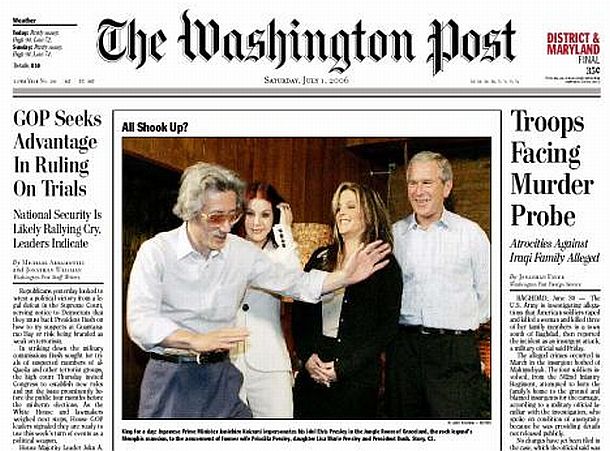
July 1st, 2006 edition of The Washington Post with photo of Japanese Prime Minister, Junichiro Koizumi doing his Elvis imitation at Graceland as President Bush, Priscilla and Lisa Marie Presley looked on during tour.
A few months earlier, U.S. Secretary of the Interior, Gale Norton, declared the Graceland estate to be a National Historic Landmark, which is the highest U.S. recognition accorded historic properties. Fewer than 2,500 such places share the honor, among them, Mount Vernon and Monticello, Virginia, the former homes of George Washington and Thomas Jefferson. Graceland is also the first, and to date, the only home of a rock `n roll star to be so designated.
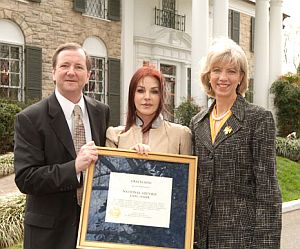
March 2006: Graceland a National Historic Landmark; with, L-to-R, Jack Soden of Elvis Presley Enterprises, Priscilla Presley, and U.S. Interior Secretary, Gale Norton.
“American culture and music changed irreversibly because of Elvis,” Secretary Norton said during her remarks. “It would be difficult to tell the story of the 20th century without discussing the many contributions made by this legendary, iconic artist.”
Former wife of Elvis, Priscilla Presley, and Jack Soden of Elvis Presley Enterprises were on hand to receive the formal certification. Less than three months later, Bush and Koizumi would make their visit to Graceland.
Prime Minister Koizumi, it turned out, was a big Elvis fan, not uncommon in Japan, where at least two Elvis fan clubs thrive with thousands of members. Prior to the Bush-Koizumi visit to Graceland, the two heads of state had conducted earlier business in Washington over two days. They had a series of talks on world and bilateral issues, ranging from Iraq and North Korea to U.S. beef exports. But following a black-tie dinner at the White House, the next day’s itinerary was devoted to Graceland.
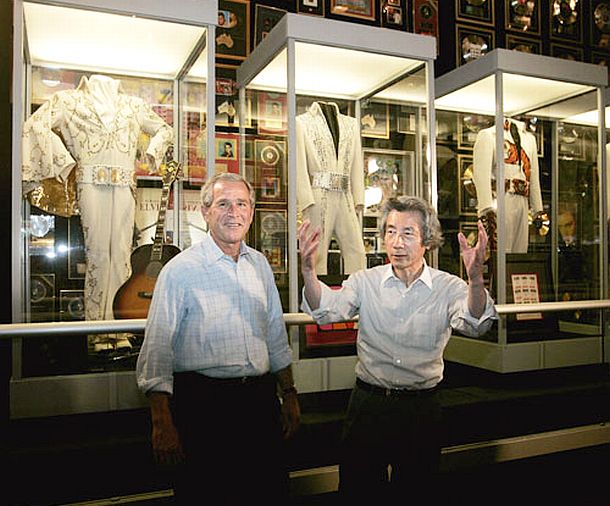
July 2006: President Bush and Japanese Prime Minister Koizumi in the awards section of Elvis Presley home at Graceland where various Presley costumes and recording awards are displayed.
On the Air Force One plane ride to Graceland, it was also “all Elvis” as White House staff and traveling press joined in the festivities. “Love Me Tender” and “Don’t Be Cruel” and other Elvis songs were played over the Air Force One public address system. DVDs of Elvis movies were available for viewing. Even fried peanut butter-banana sandwiches – an Elvis specialty – were offered to those willing to indulge.
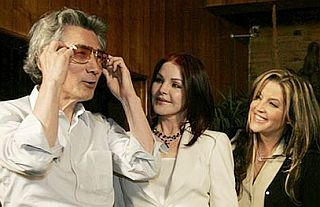 July 2006: Prime Minister Koizumi is excited to try on a pair of Elvis sunglasses as Priscilla & Lisa Marie Presley look on. |
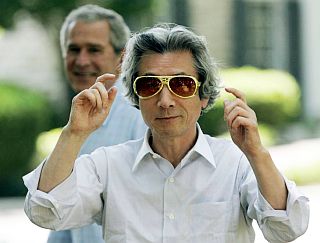 July 2006: Prime Minister Koizumi with Elvis sunglasses outside Graceland mansion as President Bush looks on. |
 July 2006: Prime Minister Koizumi outside of Graceland, in front of an Elvis pink Cadillac. |
Arriving at Graceland, which was closed to the general public while the heads of state were there, Koizumi and Bush saw what most visitors see. In the museum portion of the home, there were displays of the King’s extravagant concert costumes, his guitars, wall after wall of gold records.
In the living areas of the Graceland mansion they saw a glossy black baby-grand piano and a 15-foot-long white sofa. There was also the billiard room with multicolored fabric covering the walls and ceiling and a yellow-and-blue basement entertainment room with mirrored ceiling and triple televisions embedded in the walls.
And not least on the tour was the famously furnished Jungle Room, with its shag carpet, reportedly decorated from Elvis’s memory of a Hawaiian visit.
It was in the Jungle Room where Koizumi was treated to a pair of Elvis’s gold-rimmed sunglasses, which inspired him to offer what appeared to be a brief display of some Elvis air guitar while singing, “Glory, glory, hallelujah.” Press photos, such as that at the top of this story, captured the moment and appeared in news outlets around the world. Outside, just off the drive way and parked on the lawn was one of Elvis’s prize cars – a pink Cadillac.
Some 300 journalists came out to document and report on the trip. In fact, a separate press center was set up in the Elvis Presley Automobile Museum, a separate building where the Cadillac and an MG used in the Elvis movie “Blue Hawaii” were on display, along with other Elvis cars, reported at one time to have numbered more than 30.
While at Graceland, Bush and Koizumi shared some private time for official business in the Meditation Garden – an area where Elvis and his parents are buried next to an eternal flame.
President Bush had decided that a Graceland visit for Koizumi would be the perfect way to honor his friend and fellow world leader. The two had apparently hit it off on a personal level since their first meeting. In fact, at a 2005 birthday party for President Bush, Koizumi sang a few bars of Presley’s, “I Want You, I Need You, I Love You,”( also appropriate at the time regarding the U.S.-Japan relationship).
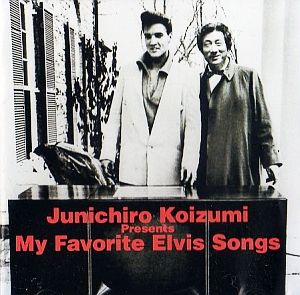
Cover of 2001 CD: “Junichiro Koizumi Presents My Favorite Elvis Songs,” which was marketed for charity purposes in Japan.
Although Elvis never performed outside of the U.S., he continued to have fans around the world, including thousands in Japan. Koizumi, who shares a birth date with Elvis, January 8th, was also an active Elvis fan back home. His brother once ran Presley’s fan club in Yokohama.
In 1987, Koizumi also played a key role in erecting a bronze statue of Presley in Tokyo. And in 2001, he personally selected 25 Elvis songs for a limited-edition charity CD released in Japan under the title, “Junichiro Koizumi Presents My Favorite Elvis Songs,” a CD that quickly sold out. (In 2009, after he retired, Koizumi attended an unveiling of another Elvis Presley statue, this one in Kobe, Japan.)
Near the end of the July 2006 visit to Graceland, President Bush, reflecting on the tour and satisfied that he helped provide a good time for Koizumi, noted: “I knew he loved Elvis,” he said of the Japanese prime minister, “I didn’t realize how much he loved Elvis.”
600,000 Visitors
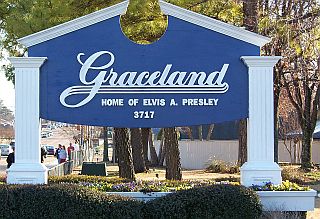
Graceland sign outside the former home of Elvis Presley.
Elvis Presley died at Graceland in August 1977 at the age of 42. Since his death, Graceland has become essentially a memorial to Presley and national monument of a kind. The site was opened to the public on June 7, 1982. It was first listed in the National Register of Historic Places on November 7, 1991, becoming a National Historic Landmark in March 2006. Since its opening to the public it has become, after the White House, one of the most-visited private homes in America with more than 600,000 visitors in recent years.
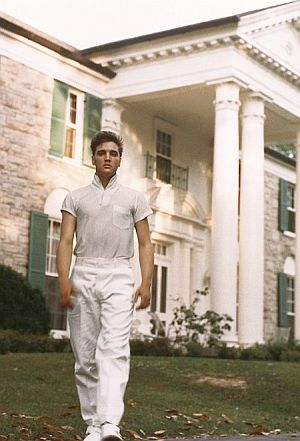
1957: Elvis at front entrance of Graceland mansion.
Graceland also includes a museum across the street where various Elvis artifacts are on display, including some of his famous Las Vegas jumpsuits, gold records, guitars he used, and other material. Elvis’ extensive collection of automobiles, including his pink Cadillac, are also housed there. And although they were put up for sale in 2015, two of Presley’s specially-outfitted airplanes were also on the grounds, exhibited there for tourists by a separate company.
Elvis originally purchased Graceland on March 19, 1957 for the amount of $102,500. In those days, the property was located in a mostly rural area, which in subsequent years filled in with residential and commercial growth expanding from Memphis. After purchasing the property Elvis spent more than $500,000 making modifications, including a low-lying stone wall of Alabama fieldstone surrounding the grounds; a wrought-iron front gate shaped as a page of sheet music with musical notes and silhouetted guitar players on each side; a kidney shaped swimming pool; a racquetball court; the “jungle room” mentioned earlier, with indoor waterfall and recording studio; and other additions. Although his performances kept him away from home a good deal, and he also had other homes, Elvis regarded Graceland as his homeplace for 20 years, from 1957-1977, during which, off and on, an assortment of family members lived there as well.
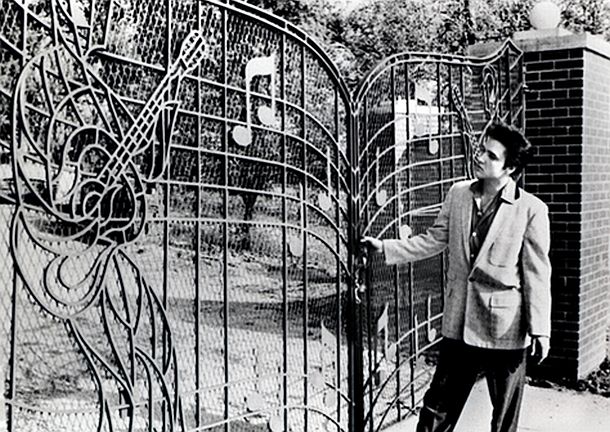
1957: Elvis Presley stands at the wrought iron gates he had made for the entrance drive at Graceland, made to resemble a page of sheet music with musical notes and guitar players depicted.
After Elvis’s death in 1977, the executor of his estate initially was his father, Vernon, who then passed it on to Elvis’ former wife, Priscilla, until daughter Lisa Marie came of age. The estate, meanwhile, faced $500,000 a year in upkeep costs and considerable taxes. There was some worry that Graceland might have to be sold in order to avoid bankruptcy. Priscilla then set about examining how historic homes and museums operated and she hired business executive Jack Soden to help turn Graceland into a tourist destination.
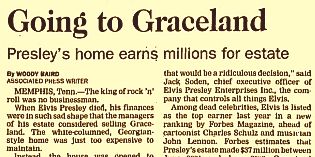
Headlines from an August 2002 Associated Press story on Graceland: “Presley’s Home Earns Millions...”
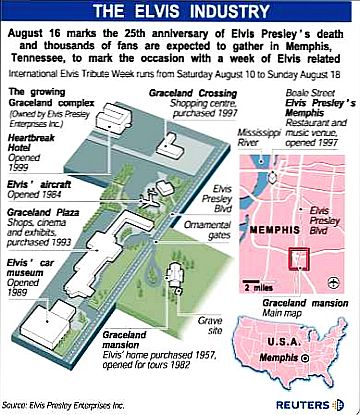
A Reuters news graphic outlining the Graceland-area businesses and properties of Elvis Presley Enterprises at that time, August 2002.
At Graceland, meanwhile, tourist visitation continued to do well through the 1990s. On the 20th Anniversary of Elvis’ death in 1997, throngs of fans descended on Graceland, including several hundred media, whose coverage of the event brought more public notice to Graceland, helping spur more visitation. Each August now, at the anniversary of Elvis’ death, thousands come to Graceland for a range of activities during “Elvis Week.” At the 25th anniversary in 2002 as estimated 40,000 people came to Graceland during Elvis Week. And Elvis’s music, even in 2002, still had popular currency. When RCA rereleased some of his singles that year to promote a greatest-hits compilation, more than a dozen of them became top five hits in Britain.
In the early 2000s, however, visitation at Graceland hit a plateau in the 500,000-to-600,000 range. Priscilla, Lisa Marie, and Jack Soden at EPE had watched visitors from the U.S. and all over the world express their enthusiasm, and open their wallets, for all things Elvis. They suspected there was more potential upside at Graceland and the Elvis Presley legacy. But they did not have the experience to take it to the next level. That’s about when some bigger players entered the picture.
Sillerman/CKX Deal
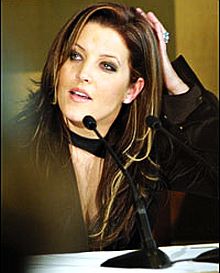
Lisa Marie Presley, 2004.
“For the past few years, I’ve been looking for someone to join forces with to expand the many facets of (Elvis Presley Enterprises), to take it to new levels internationally and to make it an even greater force in the entertainment industry,” said Lisa Marie Presley at the time of the deal.
Lisa Marie received $50 million from the sale plus stock in CKX. Priscilla Presley got $6.5 million and a 10-year consulting contract with CKX at $560,000 a year. She also received a seat on the CKX board of directors.
Sillerman and CKX got the rights to the Elvis name, image, likeness, and trademark, then used in 100 or so merchandising and licensing deals. CKX also got the publishing rights to 650 songs, royalty rights to fewer Elvis songs recorded after 1973, and royalty rights to 24 Elvis movies.
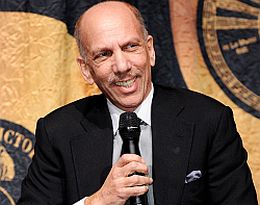
Robert Sillerman in a 2009 photograph.
Sillerman, a friend of Mel Brooks who years earlier had invested in Brooks’ Broadway production, The Producers, also came to own Muhammed Ali rights as well as the firm that managed Woody Allen, Robin Williams and Billy Crystal. In April 2006, Sillerman paid $50 million for an 80 percent stake in Muhammed Ali’s name, image and likeness. “When we created CKX and came up with the idea for it,” Mr. Sillerman said in an April 2006 interview, “we came up with three things that we thought had the greatest impact on American culture,” then naming the three: Elvis Presley, American Idol, and Muhammed Ali.
Sillerman had big plans for the future – including those built upon the licensing rights of baby boomer cultural icons like Elvis. He even had hoped to land some Beatles’ rights, but that did not happen. Still, with Graceland and the Elvis Presley legacy, Sillerman saw new business opportunities ahead. “Does it make sense to invest in Elvis Presley enterprises in Japan? Does it make sense in Germany?,” he asked at the time of the Elvis deal. “Are there things that can be done in other jurisdictions in the United States? The answer to some of the questions is obviously yes,’ he said., “we just don’t know which ones.”
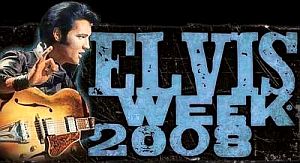
Elvis Week at Graceland has evolved into an annual mid-August celebration of the music and legacy of Elvis Presley.
In February 2006, Robert Sillerman announced plans to turn Graceland into a much improved tourist destination that would also draw international visitors. What Sillerman had in mind was something on a par with the Disney or Universal theme parks. Graceland and the immediate area would be made over to accommodate a doubling or even tripling of annual visitors, possibly to around 2 million a year. CKX began working with Disney Imagineering based in Orlando, Florida, to improve the tourist area around Graceland. While keeping the historic home intact, the make-over would include a three-mile Elvis Presley Boulevard as an entertainment district near the estate. Elvis Presley Enterprises, meanwhile, had already bought up over 120 acres of land, apartments and existing shops that would make way for the expansion.
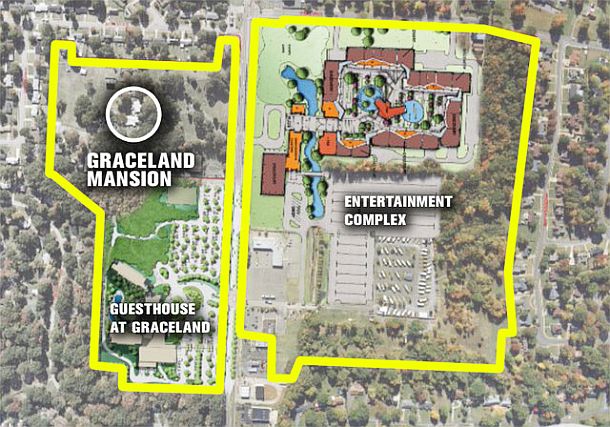
2015: Although it took time to advance from the earlier property acquisitions of Elvis Presley Enterprises and the vision Robert Sillerman’s CKX in 2005, expansion plans for the Graceland area, with a new hotel – “Guesthouse at Graceland” (lower left) – and an “Entertainment Complex,” have moved forward, collecting state and local approvals.
There was also some potential for Elvis/Graceland cross-promotion between Sillerman properties and Elvis venues. In May 2006, Sillerman’s American Idol show featured some of its contestants visiting Graceland. Not long thereafter, attendance at Graceland in July 2006 was up six percent over July 2005, which some attributed to the American Idol linkage. And in September 2006, Memphis was one of seven cities where American Idol held auditions. American Idol contestants doing Elvis songs on that show in the future was another distinct possibility.

“Viva Elvis” debuted December 2009.
After some time in development, that show, billed as a tribute to the life and music of Elvis Presley and titled “Viva Elvis,” debuted with preview performances in December 2009 at the Aria Resort & Casino.
However, Sillerman’s bigger plans for Elvis and CKX began to fall apart after he invested in Las Vegas property with the idea of creating an Elvis Presley-themed casino. That occurred not long after the economy turned bad in 2008-2010, as stocks and real estate values plummeted, when Sillerman and CKX got into financial trouble. In May 2010, Sillerman stepped down as chairman and CEO of CKX. About a year later, in May 2011, CKX was sold to Apollo Management for $512 million, and Apollo changed the name of CKX to CORE Media Group. Not long thereafter, Apollo began to sell off some of what it has acquired, though keeping American Idol, at least for the time being.

Authentic Brands Group logo.
With the ABG deal, Priscilla Presley noted in a statement: “We look forward to working with the ABG team to further promote the legacy of Elvis. This is the opportunity the family has been envisioning to expand the Graceland experience and enhance Elvis’ image all over the world.” Lisa Marie Presley added: “While I will continue to own Graceland and Elvis’ original artifacts, we are looking forward to working with our new partners to continue the growth and expansion we have been working towards. The licensing and merchandising aspect of this business is not to be confused with the fact that the property will always remain with me and my family. However, this is a great partnership for our family and Elvis fans worldwide.”
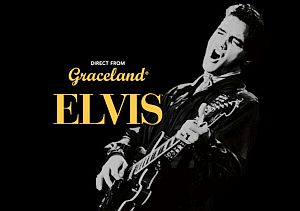
“Direct From Graceland: Elvis” – for ABG’s London exhibit.
And in February 2015, ABG announced it would establish a second permanent Elvis home in Las Vegas, at the Westgate Las Vegas Resort and Casino, on the site where Elvis had performed in earlier years.
In 1969, Elvis had played a record 58 consecutive, sold-out shows at that location at the former International Hotel. He would eventually play some 837 performances in Las Vegas.
The London and Las Vegas venues, according to ABG, demonstrated the potential for using the million or so Graceland-Elvis artifacts that often remain in storage. “Once you give someone a taste of this,” said ABG managing partner Joel Weinshanker of the Elvis exhibits and other artifacts, “they’ll want more.”
Back at Graceland proper, meanwhile, Authentic Brands was also at work. By August 2014, they introduced an interactive iPad tour guide and the Graceland Archive, in which curators exhibit and discuss material not on permanent display. ABG and EPE were also moving ahead with the planned Graceland expansion. A 450-room hotel and conference center – dubbed the Guest House at Graceland (noted on map earlier), is scheduled to open in 2016. It will be Memphis’s largest new hotel and will also include a 500-seat theater. In conjunction with the larger Graceland area development plan, EPE is also seeking to designate the area a “tourist development zone.” It also wants state and local tax breaks – as much as $40 million according to one report – noting that the projected expansion will generate jobs and business income.
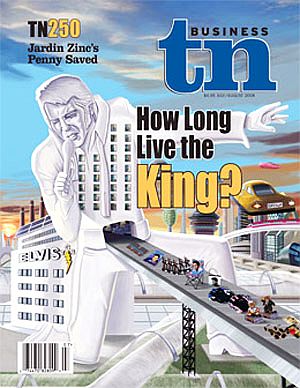
The July 2008 Tennessee Business magazine raised the question of how long the Elvis economic magic and appeal might last.
So stay tuned. Elvis hasn’t quite left the building yet – and if the investors and entertainment moguls have anything to do with it, he never will.
For additional stories on Elvis Presley at this website, see for example: “Elvis on the Road, 1955-1956” (the travels and town-by-town concert itinerary of early Elvis and his band); “Elvis Riles Florida, 1955-1956” (Elvis & band come to perform at the Florida Theater in Jacksonville, but face arrest warrants there if he “gyrates” too suggestively on stage); and “Drew Pearson on Elvis, 1956,” (a video commentary on Elvis Presley’s rapid rise to stardom by a famous syndicated newspaper columnist of that era). See also the “Annals of Music” category page for additional stories on the history of popular music, artist profiles, and selected song analysis. Thanks for visiting — and if you like what you find here, please make a donation to help support the research and writing at this website. Thank you. — Jack Doyle
|
Please Support Thank You |
____________________________________
Date Posted: 17 September 2015
Last Update: 14 April 2018
Comments to: jdoyle@pophistorydig.com
Article Citation:
Jack Doyle, “They Go To Graceland, Elvis Home a Big Draw,”
PopHistoryDig.com, September 17, 2015.
____________________________________
Sources, Links & Additional Information
|
“Celebrity Visitors” President George W. Bush and Prime Minister Koizumi weren’t the only high-profile visitors to tour Graceland in recent years. Since their July 2006 visit to Graceland, other heads of state and/or related royalty have also gone to Graceland. On August 6, 2010, Prince Albert II, Monaco’s Head of State, and his fiancée, Charlene Wittstock, on a U.S. vacation, toured Graceland. Prince William and Prince Harry of the U.K., while in Memphis for a friend’s wedding, visited Graceland on May 2, 2014, where they were joined by Princess Beatrice and Princess Eugenie for a private tour. Rock `n roll “royalty,” as well, have also had some interaction with Graceland. American singer-songwriter Paul Simon, visited Graceland in the early 1980s and wrote a song which became the title track of his 1986 world music hit album, Graceland, suggesting some homage to Elvis and his home place (Simon has also mentioned Sun Records recordings of country rhythms as an influence on the album). On May 26, 2013, Sir Paul McCartney visited Graceland, leaving a guitar pick on Elvis’s grave “so Elvis can play in heaven.” And of course, in prior years, a long list of celebrities, aspiring musicians, and other notables – from conservative columnist William F. Buckley to world famous architect, I.M. Pei – have visited Graceland. A few years after he left the White House, President Jimmy Carter and former first lady Roslyn Carter visited Graceland. |
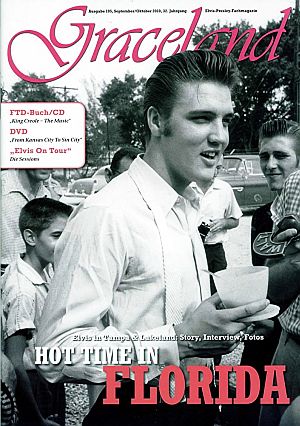 Sept/Oct 2010 sample edition of “Graceland” magazine, published by German fans since 1979, one indication of Presley’s continuing appeal abroad. |
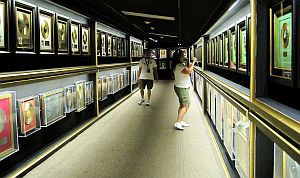 One of the exhibits of Elvis Presley gold records and other artifacts at Graceland in Memphis, TN. |
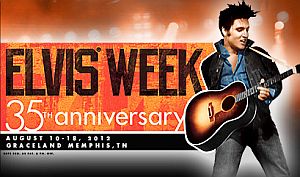 Elvis Week logo, August 2012, 35th anniversary, Graceland. |
Amy Argetsinger and Roxanne Roberts, “From the White House to Graceland,” Washington Post, June 14, 2006, p. C-3.
“Bush, Japan’s Koizumi Tour Graceland,” USA Today, June 30, 2006.
Amy Argetsinger and Roxanne Roberts, “Bush and Koizumi, Walking in Blue Suede Footprints,” Washington Post, June 30, 2006, p. C-3
Peter Baker, “Bush Takes Koizumi for Tour of Graceland,” Washington Post, Saturday, July 1, 2006.
Stephen Kaufman, “Bush, Koizumi Tour of Graceland Highlights Elvis’ Enduring Legacy; Rock Icon’s Home Attracts More than 600,000 Visitors Each Year,” U.S. Department of State, June 27, 2006.
Graceland, Official Website.
“Graceland,” Wikipedia.org.
“Elvis Presley Enterprises,” Wikipedia.org.
Woody Baird, AP, “Public Tours Of Graceland Bring High Profits,” Kentucky New Era, June 8, 1983, p. 12.
Craig Horowitz and others, “The Presley Inheritance: Elvis Squandered It, Priscilla Restored It; Now Lisa Marie Is in Charge of It,” People, Vol. 39, No. 8, March 1, 1993,
Sidebar (Presley inheritance story above), “Taking Care of (the King’s) Business,” People, Vol. 39, No. 8, March 1, 1993.
Woody Baird, Associated Press, “Graceland: Presley’s Home Earns Millions For Estate,” The Daily Courier (Prescott, Arizona), August 16, 2002, p. 15-A.
Associated Press, “Lisa Marie Presley Selling Elvis Estate,” USA Today, December 16, 2004.
Andy Serwer, “The Man Who Bought Elvis; Investor Robert Sillerman Is Combining the King, American Idol, and Other Enter- tainment Assets to Build His Next Media Conglomerate,” Fortune, December 12, 2005.
Woody Baird, Associated Press, “All Shook Up Over Graceland Deal; Now That Outsiders Run the Elvis Presley Mansion, Those Who Flock to Memphis Every Year Worry That it Won’t Be Quite So Homey,” Los Angles Times, August 11, 2005.
Associated Press, “Media Mogul Wants To Improve Graceland,” The Victoria Advocate (Victoria, Texas), March 5, 2006.
Associated Press, “Elvis’ Graceland Becomes a National Landmark; Home of ‘King of Rock ‘n’ Roll,’ White House Receive Rare Distinction,” NBCtoday.com (includes video clip with Campbell Brown and Priscilla Presley), March 27, 2006.
Julie Bosman, “$50 Million Puts Ali in Ring With Elvis and ‘American Idol’,” New York Times, April 12, 2006.
Woody Baird, AP, “Lisa Marie Worries Elvis Fans By Selling Piece of Graceland,” The Victoria Advocate (Victoria, TX), August 6, 2006, p. 6-D.
David Lieberman, “Master of the Fame Game” (Robert Sillerman), USA Today, October 17, 2006.
Donnie Snow, “A Little More Action” Busi- nessTN, July 2, 2008.
Anthony Effinger and Daniel Taub, “American Idol Sillerman Dealt Elvis Default Heartbreak in Vegas,” Bloomberg.com, June 1, 2009.
“Robert F. X. Sillerman,” Wikipedia.org.
David Lieberman, “’American Idol’ Owner CKX Sells To Financial Firm, Ending Robert F.X. Sillerman’s Dream,” Deadline Holly- wood, May 10, 2011.
Adrian Sainz, “How Priscilla Presley Turned Elvis’ Graceland Into Big Business 30 Years Ago,” Billboard, June 13, 2012.
Alan Hanson, “Elvis Presley Enterprises …Who Owns It Now?,” Elvis History Blog, February 2013.
Associated Press, “Elvis Presley’s Intellectual Property Rights Sold to Authentic Brands,” Billboard, November 19, 2013.
“First Look at Planned 450-Room Hotel at Elvis’ Graceland,” Memphis Business Journal, May 16, 2014.
“Elvis Estate Seeks Tax Breaks for Graceland Expansion,” Don’t Mess With Taxes, August 17, 2014.
“Elvis Presley Enterprises Sold! Management of Graceland and EPE in Corporate Hands,” Elvis Information Network, 2004-2015.
Kevin McKenzie, “Years of Acquisition, Demolition Prepared for Graceland Expansion in Memphis,” The Commercial Appeal, January 7, 2015.
Stuart Miller, “Graceland Is Taking Its Show on the Road to Las Vegas,” New York Times, February 4, 2015.
“Elvis Presley,” Authentic Brands.com.
________________________________________